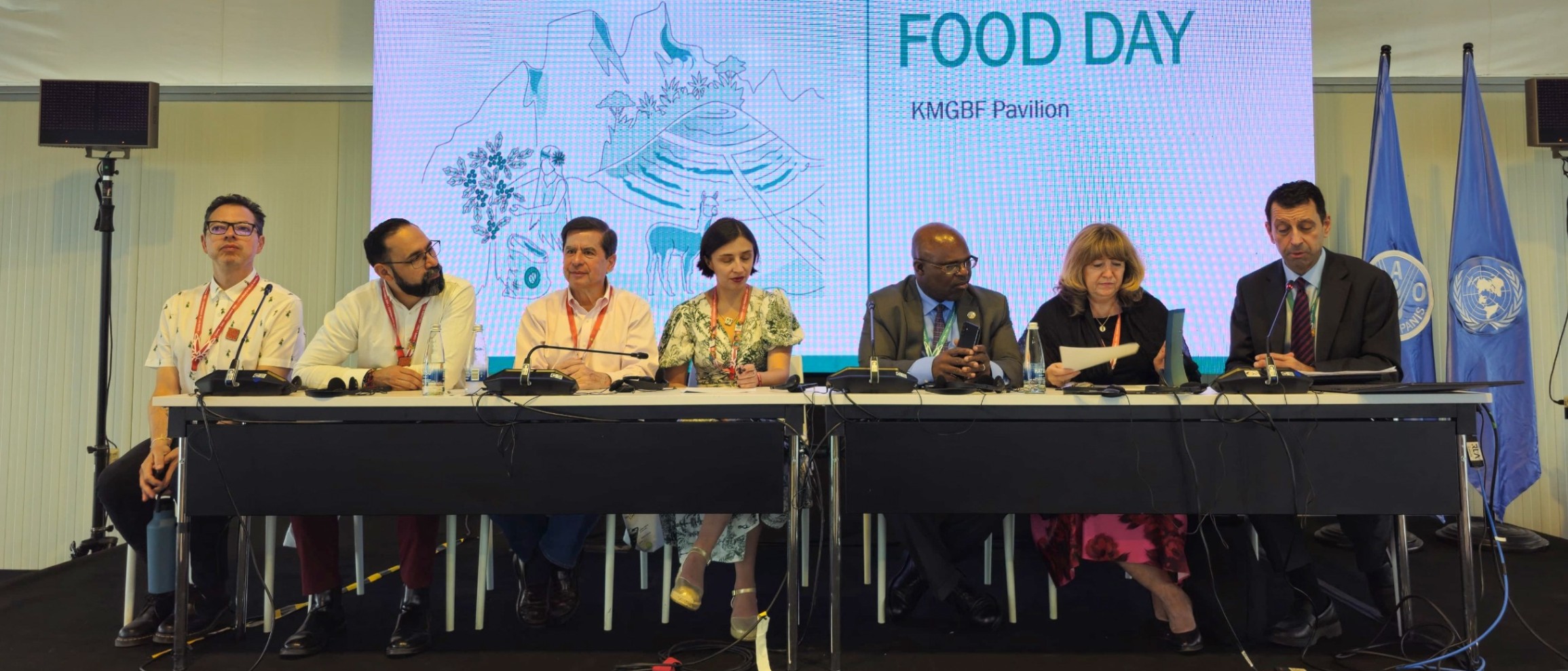Caring for biodiversity is caring for the future of food
Advancing nature conservation through food production and consumption was a key discussion topic on the COP16 agenda: Biodiversity and Agrifood Systems, caring for our present to cultivate a future for all. FAO, in partnership with the CBD and the Ministries of Agriculture and Environment of Colombia, opened a space to review the progress made in food and agriculture towards the goals of the Kunming-Montreal Global Biodiversity Framework

©FAO/Max Valencia
As part of the agenda for the 16th edition of the United Nations Conference on Biodiversity (CBD), held in Colombia, October 28 featured a review of the status of agrifood systems, challenges, and opportunities for improvement on Food Day.
The COP16 side event, organized by the United Nations Food and Agriculture Organization (FAO), in partnership with the CBD, included the participation of the Ministers of Agriculture and Rural Development (MinAgricultura); and the Interior, Cultures, Arts, and Knowledge as well as the Minister of Mines and Energy; together with delegates from 13 countries.
The purpose? To evaluate the measures taken, the results achieved to date, and the new commitments we must take on as humanity in the face of the triple planetary crisis: climate change, pollution, and biodiversity loss, the latter being a consequence of the first two. Currently, only nine species account for 66% of our global crop production, though more than 6,000 species have existed throughout history.
"Halting biodiversity loss must include the integration of rural communities, who are the custodians of this richness," stated Minister of Agriculture Martha Carvajalino, noting that this is how the National Government has approached it, adding that these communities should not bear the most significant impacts of climate change.
Minister Carvajalino said that Colombia's Biodiversity Conservation Action Plan focuses on transitioning to agroecology, productive reconversion, and fair land distribution. She also highlighted the recent appointment of Colombia as the host of the Second International Conference on Agrarian Reform and Rural Development +20, to be held in 2026, approved last week at the FAO-organized World Committee on Food Security.
"At the close of Food Day, we want to call on everyone to join forces and commit to a different world, without hunger and in peace, where we can talk about a world that builds a revolution for life," she concluded.
David Cooper, Deputy Executive Secretary of the CBD, emphasized that "10 of the goals in the Kunming-Montreal Global Biodiversity Framework (KMGBF), and indeed each of the 23 goals, are linked to food."
Godfrey Magwenzi, Chief of Staff of FAO, highlighted the strong commitment of the Government of Colombia and the integration of actions expressed by MinAgricultura and MinAmbiente on Food Day. "We need to view food and agriculture holistically; this means countries must coordinate actions to promote sustainability and the protection of biodiversity."
"On this Food Day, we have seen the successes and challenges that countries face in advancing the integration of biodiversity-friendly actions, which are the foundation of food," said the FAO Chief of Staff, emphasizing the key role of youth in these matters.
"FAO is committed to the fight against hunger, which today affects one in 11 people worldwide, and the main tool to combat it lies in agrifood systems. However, their operation must improve by making efficient and sustainable use of natural resources and produced food," said Kaveh Zahedi, Director of FAO's Office of Climate Change, Biodiversity, and Environment.
"Solutions in agrifood systems are absolutely essential to address major challenges related to climate, biodiversity, and land management. They should be prioritized in multilateral environmental agreements, receive more qualitative and quantitative resources, and be fully integrated into national planning processes and strategies," he added.
The conservation and sustainable use of biodiversity has been and continues to be fundamental to FAO's mandate. Its work on biodiversity is guided by its Strategy on Mainstreaming Biodiversity across Agricultural Sectors and the Action Plan, focusing on building resilient agrifood systems to address food insecurity and malnutrition in all its forms. Therefore, as a central commitment to achieving the proposed targets, FAO, in conjunction with the CBD Secretariat, will launch the Agri-NBSAPs Support Initiative on October 30, as part of COP16.
The Agri-NBSAPs aim to help countries identify new financial tools, schemes, and mechanisms to encourage biodiversity-friendly practices within agrifood systems, accelerating the implementation of the KMGBF.
"Through this initiative, we seek to support countries in creating and implementing action plans for a more sustainable, inclusive, and efficient agriculture that also respects the planet's biodiversity. Topics like good agricultural practices, the transition to sustainable livestock models, proper land and water use, precision agriculture, and deforestation reduction should be included in National Plans to move towards efficient and sustainable agrifood systems," said Agustín Zimmermann, FAO Representative in Colombia.
Invisible bonds connect us all, including plants, animals, microorganisms, and humans; people who work in food production and those who consume that food. In this way, biodiversity and food are closely linked.
Contact
Maria Elena Alvarez Press and Content Officer [email protected]
